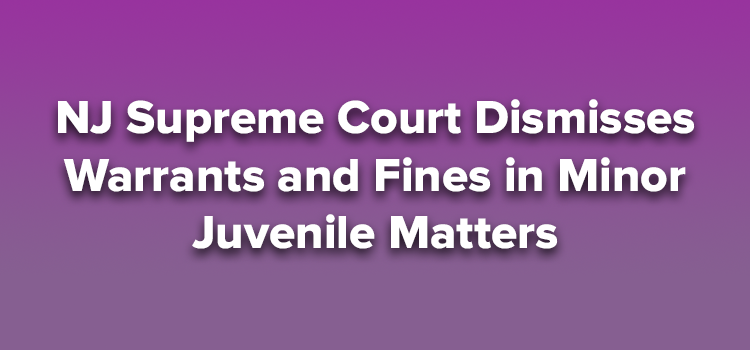
On October 21, 2020, the New Jersey Supreme Court ordered the dismissal of hundreds of old juvenile warrants for minor matters and more than $140,000 in discretionary juvenile fines. The order is part of a broader initiative to ensure equal justice in the courts.
New Jersey Supreme Court’s Equal Justice Plan
In July, the New Jersey Supreme Court released its Action Plan for Ensuring Equal Justice, which identified nine reforms aimed to remove disparities within the court system and eliminate institutional obstacles to justice. One of the action items called for supporting juvenile rehabilitation by examining options for retroactively rescinding and prospectively eliminating court-imposed punitive fines and penalties for juveniles.
A new law, N.J.S.A. 2A:4A-43(b)(8), also took effect in July, under which courts will no longer impose discretionary fines as part of juvenile adjudications. However, more than $140,000 in fines remain outstanding that were imposed on juveniles before July 1, 2020. Those are now being dismissed under the court’s order.
Dismissal of Juvenile Fines and Warrants
The New Jersey Supreme Court’s Order vacates all outstanding discretionary juvenile fines, effective immediately.“The young people who owe those fines – including disproportionate numbers of youth of color – overwhelmingly lack the capacity to make necessary payments, and the fines serve only to prolong involvement with the juvenile and criminal justice systems,” Chief Justice Stuart Rabner wrote.
The New Jersey Supreme Court’s Order also addresses open failure to appear warrants issued more than five years ago for non-violent 4th degree or lesser juvenile charges. “Based on the passage of time, those warrants no longer serve their intended purpose under N.J.S.A. 2A:4A-34(c)(1) and 34(c)(2), yet they continue to create barriers to employment, housing, education, and social services,” Chief Justice Rabner wrote.
Accordingly, the New Jersey Supreme Court has directed judges to issue orders vacating all open juvenile warrants for failure to appear issued more than five years prior to the date of the Order for non-violent 4th degree or lesser offenses. Going forward, Assignment Judges are authorized and directed to issue orders on an annual basis to vacate all open juvenile warrants for failure to appear that are more than five-years-old as of that date for non-violent 4th degree or lesser offenses.
In State v. Antwan J. Horton (A-26-19/082698) (Decided June 12, 2020), the Supreme Court of New Jersey confirmed that a trial court can’t replace a juror after the jury announced that they had reached a partial verdict. While the state’s highest court found that it was settled law, the trial court and Appellate Division had reached the opposite conclusion.
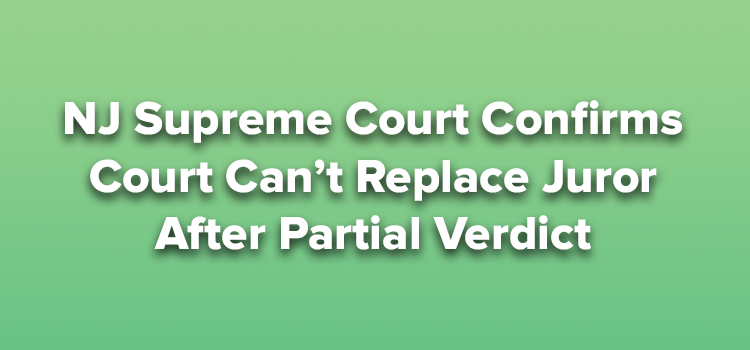
Facts of State v. Horton
After the jury announced that they had reached a partial verdict, the trial court excused and replaced a juror who had a preplanned vacation and who had been part of deliberations. The judge did not have the jury return a partial verdict. Instead, the court excused the juror and reconstituted the jury with a replacement juror.
Defendant Antwan Horton argued that the deliberations had proceeded too far to reconstitute the jury and moved for a mistrial. Nevertheless, the trial judge denied that motion. Defendant requested that the judge voir dire the jury to determine its ability to begin anew with the replacement juror. Instead, the judge instructed the reconstituted jury to discard the partial verdict and begin deliberations anew. The jury reached a unanimous verdict three days later.
Defendant appealed, arguing that the juror substitution after the jury had reached a partial verdict denied him a fair trial. The Appellate Division affirmed defendant’s conviction, speculating that the substituted juror was a “full participant[] in the mutual exchange of ideas.” The appeals court noted that during deliberations, the reconstituted jury requested transcripts, asked for testimony to be played back, and asked additional questions before returning a verdict three days later. Relying on the totality of the circumstances, the court found that the trial court did not abuse its discretion by substituting a juror.
NJ Supreme Court’s Decision in State v. Horton
The New Jersey Supreme Court reversed in a per curium opinion. It held that under settled New Jersey law, juror substitution is impermissible if the jury has reached a partial verdict. According to the court, the proper course is for the trial court to take the partial verdict and declare a mistrial on the open counts.
“We have rich and fulsome jurisprudence on the issue of juror substitution in the face of a jury having reached a partial verdict. Quite simply, substitution is impermissible,” the court explained. “The proper course is for the trial court to take the partial verdict and declare a mistrial on the open counts.”
As noted by the court, it previously held in State v. Ross, 218 N.J. 130, 151 (2014) that “[w]hen the circumstances suggest a strong inference that the jury has affirmatively reached a determination on one or more factual or legal issues the trial court should not substitute an alternate for an excused juror.” According to the New Jersey Supreme Court, although the settled body of law directly applied, it was not followed at the trial or appellate level.
“In a case like this, where defendant was facing charges of murder, attempted murder, and weapons possession offenses, we cannot know whether the jury will ‘start anew’ with the entry of a substitute juror and discard their views simply because there is a new juror amongst them,” the court wrote. “Nor can we know if the new juror will exercise independence or simply go along with the opinions of the existing jurors. We cannot know or speculate whether the replacement juror was a ‘full participant[] in the mutual exchange of ideas.’” Based on the foregoing, the court held that the safest and fairest course is to take a partial verdict, declare a mistrial, and constitute a new jury to hear the remaining counts.
In Gourmet Dining, LLC v. Union Township, (A-8-19/083146) (Decided June 30, 2020), the Supreme Court of New Jersey held that a high-end restaurant operated by a for-profit entity, but housed in a building on the Kean University campus, does not qualify for exemption from local property taxation.
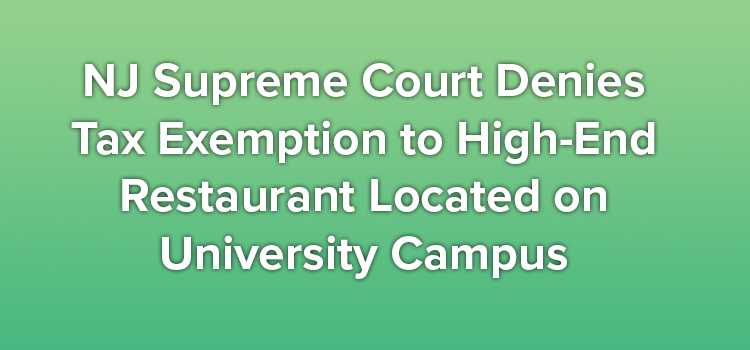
New Jersey’s Property Tax Exemption Statutes
Under the New Jersey Constitution, all real property within New Jersey is subject to taxation unless it qualifies for a statutory exemption. N.J.S.A. 54:4-3.3 exempts from taxation property belonging to the State, counties, or municipalities, or their agencies and authorities, that is used for a public purpose. Meanwhile, N.J.S.A. 54:4-3.6 exempts certain property of various non-profit organizations, including: “all buildings actually used for colleges, schools, academies or seminaries, provided that if any portion of such buildings are leased to profit-making organizations or otherwise used for purposes which are not themselves exempt from taxation, said portion shall be subject to taxation.”
The Legislature has also established several limitations on the otherwise exempt status of property. For instance, N.J.S.A. 54:4-2.3 provides that real property entitled to tax exemption loses its exemption when leased to a person or entity whose property is not exempt. Additionally, under N.J.S.A. 54:4-1.10, an arrangement that does not technically qualify as a lease, but still operates like one, is subject to taxation.
Facts of Gourmet Dining, LLC v. Union Township
Gourmet Dining, LLC owned and operated a fine dining restaurant named Ursino in a Kean University building. In October 2011, the Kean University Foundation, Inc. and Gourmet Dining entered into a Management Subcontract Agreement (MSA), which conferred on Gourmet Dining the exclusive right to operate, manage, and control Ursino. Gourmet Dining agreed to pay the Foundation an annual “management fee” and a percentage of Ursino’s gross revenue.
The restaurant began operation in late October 2011. In August 2012, Union Township issued a letter notifying Gourmet Dining that it would receive a tax bill for the last two months of the 2011 tax year and the entirety of the 2012 tax year. Gourmet Dining did not challenge those initial assessments but did challenge the 2013 and 2014 tax assessments. It ultimately appealed to the Tax Court.
The Tax Court granted summary judgment in favor of Union Township. The court first held that N.J.S.A. 54:4-3.3 applied because the University is a State governmental entity and the building constitutes governmental property. Concluding that Gourmet Dining had not established that the subject property is used for a public purpose pursuant to N.J.S.A. 54:4-3.3, or that its actual use of the property was for “colleges, schools, academies or seminaries” as required by N.J.S.A 54:4-3.6, the court held that Gourmet Dining was not entitled to tax exemption under either provision. And reasoning that the “rights, powers, and obligations conferred” through the MSA demonstrate that that agreement — even if not denominated a lease by the parties — is “a lease for legal purposes,” the Tax Court found the property taxable under N.J.S.A. 54:4-2.3 and N.J.S.A. 54:4-1.10.
The Appellate Division reversed. In support, the appeal court cited the following facts: the restaurant is located on-campus; University students and their parents regularly dine there; the restaurant provides students and members of the University community “an alternative dining experience”; Gourmet Dining’s annual management fees are used for scholarships; the University’s Board determined “that having a critically acclaimed, upscale restaurant on campus enhances the public’s perception of the University as a forward-looking institution, and thereby serves as an important recruiting tool”; many of the restaurant’s employees are students; and the restaurant uses produce grown on the University grounds and provides the University with compostable waste. The Appellate Division also rejected the Tax Court’s conclusion that Gourmet Dining is “the ‘functional’ equivalent” of a lessee.
NJ Supreme Court’s Decision in Gourmet Dining, LLC v. Union Township
The New Jersey Supreme Court reversed. The court held that the arrangement by which Gourmet Dining operates Ursino is taxable as a lease or lease-like interest.
“We further hold that the public-benefit-oriented exemption provisions in issue were not intended to exempt the for-profit operator of a high-end, regionally renowned restaurant situated on a college campus, when the overriding purpose of this commercial endeavor is focused on profitmaking,” Justice Jaynee LaVecchia wrote. “The Tax Court properly held that Gourmet Dining, as the exclusive operator and manager of this restaurant establishment, must bear its fair share of the local real property tax burden.”
In reaching its decision, the New Jersey Supreme Court found that the Appellate Division’s holistic approach to the public purpose inquiry was “mistaken.” As explained by the court, the public purpose must be the “paramount factor” in an arrangement with a private entity’s use of public property. “For a tax exemption to apply, any private advantage must be incidental or subordinate,” Justice LaVecchia wrote. “Here that is not so.” She added: “The commercial success of this competitive high-end restaurant located on the University’s campus is the paramount factor in this arrangement. Providing food services for students, or even faculty or administrators, was not its key purpose.”
The New Jersey Supreme Court rejected Gourmet Dining’s claim that it is merely a manager and operator of the restaurant facility, not a tenant or lessee. According to the court, Ursino is taxable under N.J.S.A. 54:4-1.10, as the legislative intent seems clear. “By enacting the loophole-closing provision of N.J.S.A. 54:4- 1.10, the Legislature indicated that it did not wish for the public at large to underwrite the local tax obligation of the private operator of a for-profit commercial establishment on public property,” Justice LaVacchia wrote. The court also rejected the argument that Gourmet Dining is exempt from taxation under N.J.S.A. 54:4-3.6. As explained by the court, Gourmet Dining is a for-profit entity, and the restaurant, as contemplated by the MSA, is intended to make a profit. “Gourmet Dining receives the gross revenue and, from that, it pays operating expenses — which notably expressly reference payment of local taxes — and fees to the Foundation,” Justice LaVecchia wrote. “As the Tax Court reasoned, the profit, after all expenses are paid, goes to Gourmet Dining. Thus, Gourmet Dining’s use of the subject property does not constitute a use for the ‘college’ but rather for itself.”
In the Matter of Ridgefield Park Board of Education (A-2-19/083091) (Decided August 17, 2020), the Supreme Court of New Jersey held that the health insurance premium contribution rates paid by the Ridgefield Park Education Association’s members were preempted by statute and therefore non-negotiable. According to the state’s highest court, PERC’s construction of Chapter 78 comports with the statute’s language and the Legislature’s stated objective to achieve a long-term solution to a fiscal crisis.
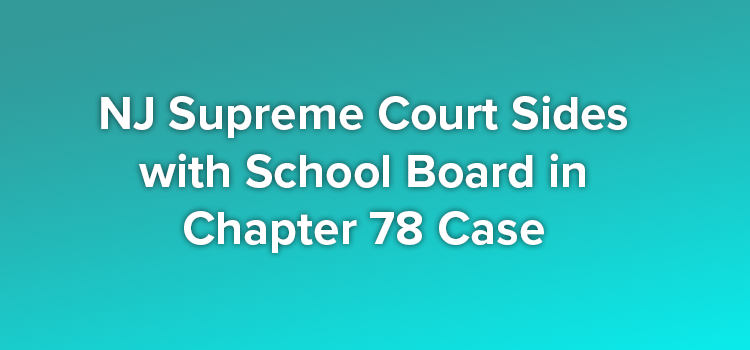
Facts of Matter of Ridgefield Park Board of Education
The case involves a dispute between the Ridgefield Park Board of Education (Board) and the Ridgefield Park Education Association (Association) concerning Board employees’ obligations to contribute to the cost of their health care benefits under Chapter 78.
The law prescribed annual increases in health care contributions over four years for those employed by a local board of education and required those employees to achieve full implementation of the increased contributions (Tier 4) in the fourth year after the statute’s effective date or, for employees already subject to a CNA, in the fourth year after the expiration of that agreement. Chapter 78 also provided that when an employer and its employees negotiated the next CNA after the employees in a bargaining unit reached full implementation of the share of the cost of health care premiums mandated by N.J.S.A. 52:14-17.28c, they would negotiate employee health care contributions as if that premium share were part of their previous CNA.
The Board and the Association negotiated a CNA covering 2011-2014 that went into effect three days after the Legislature enacted Chapter 78. The 2011-2014 CNA expired before the employees achieved full implementation of the premium share set forth in N.J.S.A. 52:14-17.28c (Tier 4). After the 2011-2014 CNA expired, the Board and the Association negotiated a CNA covering 2014-2018, which, like its predecessor, stated that employees shall contribute 1.5% of their salary towards health insurance or the minimum set forth by statute, regulation, or code.
During the 2014-2015 school year, the employees contributed to the cost of their health care at the full premium share required by N.J.S.A. 52:14-17.28c (Tier 4). The Board and the Association disputed Chapter 78’s impact on employee contributions for the CNA’s remaining three years. The Board contended that Chapter 78 preempted any negotiated term for those contributions and that the Association’s members were required to contribute to their health benefits at the Tier 4 level for the duration of the CNA. The Association contended that Chapter 78 did not preempt the 1.5% contribution rate set forth in the 2014-2018 CNA.
The Board and the Association petitioned PERC for a scope-of-negotiations determination. PERC held that the health insurance premium contribution rate set forth in the 2014-2018 CNA was preempted by Chapter 78 and granted the Board’s request for a restraint of binding arbitration as to that issue. The Appellate Division reversed, concluding that adherence to Chapter 78’s plain language would bring about an “absurd result” contravening legislative intent, and required the employees to contribute only 1.5% of their salaries for the three contested years.
NJ Supreme Court’s Decision in Matter of Ridgefield Park Board of Education
The New Jersey Supreme Court reversed. It agreed with PERC’s determination that the health insurance premium contribution rates paid by the Association’s members were “preempted by statute” and therefore non-negotiable. As Justice Patterson explained:
We recognize a legitimate argument that N.J.S.A. 18A:16-17.2 makes clear that when employees reach the Tier 4 contribution level in the first year of a CNA, they must continue to contribute at that level until they negotiate a successor CNA providing for a lower rate of contribution, and that successor CNA goes into effect. When the statutory language is considered in conjunction with Chapter 78’s purpose and legislative history, that legislative intent is plain.
In reaching its decision, the court acknowledged that the Legislature did not expressly discuss the scenario in which the employees reached “full implementation” of the premium share with three years remaining in the term of their current CNA. However, the court further concluded that the Legislature implicitly addressed the setting of this case, by making the Tier 4 contribution rate the status quo from which a successor CNA would be negotiated. “Moreover, nothing in the statute authorizes an immediate reduction of employee health care contribution rates to their pre-Chapter 78 levels,” Justice Patterson wrote. “To the contrary, the Board submits, N.J.S.A. 18A:16-17.2 provides that once achieved, Tier 4 contribution levels are to remain in effect unless and until the parties negotiate lower health insurance premium contribution rates in the next CNA.”
The New Jersey Supreme Court went on to conclude that to the extent that N.J.S.A. 18A:16-17.2 leaves any ambiguity as to legislative intent, the legislative history of Chapter 78 resolves that ambiguity. “It demonstrates that the Legislature viewed public employee health care costs to present a fiscal crisis and that it acted to provide a long-term solution to that crisis,” Justice Patterson wrote. “The legislative history bolsters the Board’s argument that the Legislature intended that Tier 4 contribution rates would remain in effect for the duration of the term of the CNA in effect when the employees reached ‘full implementation.’”
Lastly, the New Jersey Supreme Court did not share the Appellate Division’s view that PERC’s interpretation of the statute gives rise to an absurd result. “N.J.S.A. 18A:16-17.2’s impact on employee health benefit contributions based on the timing of a given CNA is not an ‘absurd result’ warranting a departure from the statute’s terms,” Justice Patterson wrote. “The Legislature has the authority to make judgments about how best to achieve its objectives, subject to constitutional constraints.”
In Estate of Brandon Tyler Narleski v. Nicholas Gomes (A-9/10-19/083169) (Decided September 17, 2020), the Supreme Court of New Jersey held that an underage adults can be held civilly liable to a drunk driving victim if they allow underage drinking in their homes, and if the guest causing the crash became visibly intoxicated in the defendant’s home, and if it was reasonably foreseeable that the visibly intoxicated guest would leave the residence to operate a motor vehicle and cause injury to another. According to the court, it doesn’t matter if the defendant owned the home or provided the alcohol.
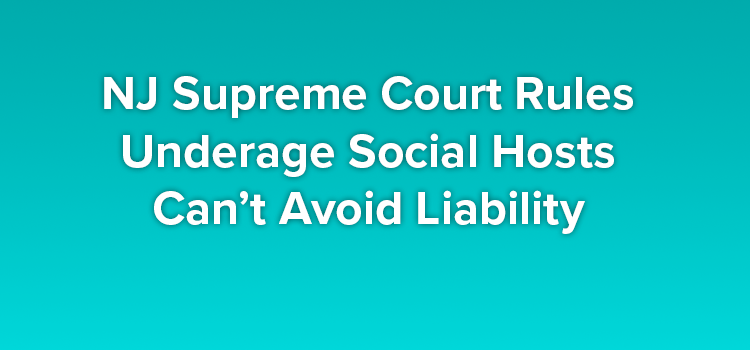
Facts of Estate of Narleski v. Gomes
Nineteen-year-old Mark Zwierzynski permitted underage adult friends to consume alcoholic beverages in his home. Nineteen-year-old Brandon Tyler Narleski and twenty-year-old Nicholas Gomes left the home severely intoxicated. Shortly afterwards, Gomes lost control of his vehicle and crashed. Narleski died at the scene. Gomes’s blood alcohol concentration was twice the legal limit.
Narleski’s parents filed a wrongful death action against Gomes, Gomes’s parents, and Amboy Food Liquor and News (Amboy), where the underage Narleski purchased the alcohol. In turn, Amboy filed a third-party complaint against Zwierzynski. The trial court granted Zwierzynski’s motion for summary judgment, finding that he did not have a duty to supervise his friends.
The Appellate Division affirmed the dismissal of the complaint against Zwierzynski. However, it declared that, going forward, an underage adult “shall owe a common law duty to injured parties to desist from facilitating the drinking of alcohol by underage adults in his place of residence, regardless of whether he owns, rents, or manages the premises.”
NJ Supreme Court’s Decision in Estate of Narleski v. Gomes
The New Jersey Supreme Court reversed, with Justice Barry Albin writing on behalf of the court.
“We now hold that an underage adult defendant may be held civilly liable to a third-party drunk driving victim if the defendant facilitated the use of alcohol by making his home available as a venue for underage drinking, regardless of whether he is a leaseholder or titleholder of the property; if the guest causing the crash became visibly intoxicated in the defendant’s home; and if it was reasonably foreseeable that the visibly intoxicated guest would leave the residence to operate a motor vehicle and cause injury to another,” Justice Albin wrote. “An underage adult, by law, may sue and be sued, may drive a motor vehicle, and has the same civil obligations as any other citizen. He too is bound by the social compact. His age does not make him immune from legal responsibility for the violation of an established duty that is intended to protect others from foreseeable harm.”
In reaching its decision, the New Jersey Supreme Court noted that the text and legislative history of the Social Host Liability Act refute any argument that it was intended to replace or stunt the development of the common law of social host liability in cases where alcohol is provided to intoxicated minors and underage adults. Accordingly, the court rejected any interpretation of the Social Host Liability Act that would lead to the “absurd conclusion that the Legislature intended to create a liability-free zone for underage social hosts who knowingly provide alcohol to visibly intoxicated minors and underage adults who negligently cause injury to third parties as a result of their intoxication.”
The court also found that the factors for determining whether to recognize a duty to refrain from conduct that poses an unreasonable risk of foreseeable harm to others, which include the relationship of the parties, the nature of the attendant risk, the opportunity and ability to exercise care, and the public interest in the proposed solution, also supported its decision. “Weighing those factors, the Court concludes that an underage social host, who makes his residence available and facilitates underage drinking, has a duty not to knowingly provide or allow self- service of alcohol to a visibly intoxicated guest and, if a guest becomes visibly intoxicated, to take reasonable steps to prevent the guest from operating a motor vehicle,” Justice Albin wrote.
The court went on to establish that a plaintiff injured by an intoxicated underage social guest may succeed in a cause of action against an underage social host if the plaintiff can prove by a preponderance of the evidence the following: (1) The social host knowingly permitted and facilitated the consumption of alcoholic beverages to underage guests in a residence under his control. This element does not require that the social host be a leaseholder or titleholder to the property. It is enough that the social host has the ability and apparent authority to give others access to the property; (2) The social host knowingly provided alcohol to a visibly intoxicated underage guest or knowingly permitted the visibly intoxicated underage guest to serve himself or be served by others. It is no defense that the underage guests bought and brought the alcoholic beverages that they or others consumed; (3) The social host knew or reasonably should have known that the visibly intoxicated social guest would leave the premises and operate a motor vehicle and therefore would foreseeably endanger the lives and property of others; (4) The social host did not take any reasonable steps to prevent the intoxicated guest from getting behind the wheel of the vehicle; and (5) The social guest, as a result of intoxication facilitated by the social host, negligently operated a vehicle and proximately caused injury to a third party.
Finally, the New Jersey Supreme Court held that because the duty recognize by the court was foreshadowed by precedent it should apply in the case of Zwierzynski. “Applying the duty here is also consistent with the usual rule that the prevailing party who brings a claim that advances the common law should receive the benefit of his efforts,” Justice Albin explained.
In Flanzman v. Jenny Craig, Inc., the Supreme Court of New Jersey held that an arbitration agreement that did not name the arbitrator, designate an arbitration organization to conduct the proceeding, or set forth a process for the parties to choose an arbitrator was still enforceable.
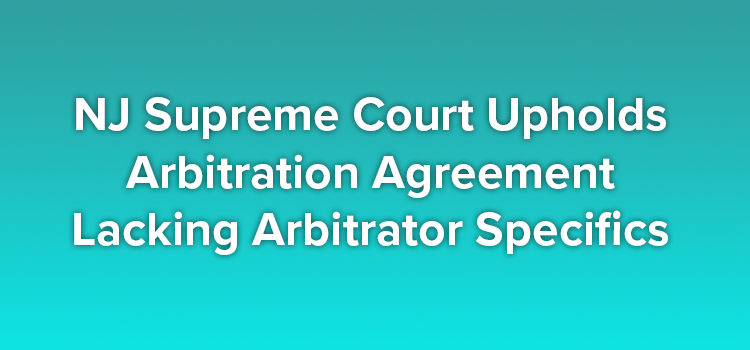
Facts of Flanzman v. Jenny Craig, Inc.
In approximately July 1991, Jenny Craig, Inc. hired Marilyn Flanzman to work as a weight maintenance counselor. In May 2011, Flanzman signed a document entitled “Arbitration Agreement” (Agreement) in connection with her employment. In the Agreement, Flanzman and JC USA agreed to resolve their disputes by “final and binding arbitration” that would take the place of “a jury or other civil trial.” Although the Agreement stated that an arbitrator would resolve the parties’ disputes, it did not name the arbitrator, designate an arbitration organization to conduct the proceeding, or set forth a process for the parties to choose an arbitrator.
In February 2017, Flanzman’s managers informed her that her hours would be reduced from 35 to 19 hours per week. Two months later, Flanzman’s managers further reduced her hours to approximately thirteen hours per week. In June 2017, they reduced her hours to three hours per week, at which point she left her employment. At that time, Flanzman was 82-years-old.
Flanzman brought suit, asserting claims for age discrimination, constructive discharge, discriminatory discharge, and harassment. Relying on the Agreement, defendants moved to dismiss the complaint and to compel arbitration. Defendants contended that California law governed the Agreement and that the Agreement was enforceable. The trial court granted the motion to dismiss and ordered the parties to arbitrate Flanzman’s claims. It held that California law governed the arbitration and that the arbitral forum is assumed to be California.
The Appellate Division agreed and reversed the order compelling arbitration. “We hold that the parties lacked a ‘meeting of the minds’ because they did not understand the rights under the arbitration agreement that ostensibly foreclosed plaintiff’s right to a jury trial,” the panel stated. The appeals court further held that if the parties select no “arbitral institution,” they must at least identify “the general process for selecting an arbitration mechanism or setting” in order for their agreement to be binding.
NJ Supreme Court’s Decision in Flanzman v. Jenny Craig, Inc.
The New Jersey Supreme Court reversed, holding that the Agreement is enforceable. “Under principles of New Jersey law that generally govern contracts, the Agreement at issue is valid and enforceable,” Justice Anne Patterson wrote.
According to the court, the New Jersey Arbitration Act (NJAA), which provides a default procedure for the selection of an arbitrator and generally addresses the conduct of the arbitration, clearly expresses the Legislature’s intent that an arbitration agreement may bind the parties without designating a specific arbitrator or arbitration organization or prescribing a process for such a designation. The court further concluded that given the NJAA’s default provisions supplying terms missing from an arbitration agreement, a court’s enforcement of an agreement supplemented by those terms comports with common-law principles of New Jersey contract law.
The New Jersey Supreme Court also found that the Agreement satisfied the standard set forth in Atalese v. U.S. Legal Services Group, 219 N.J. 430, 443 (2014), which provides that “under New Jersey law, any contractual ‘waiver-of-rights provision must reflect that [the party] has agreed clearly and unambiguously’ to its terms.” According to the state’s highest court, the Appellate Division erred in setting forth a requirement for arbitration agreements that was not imposed in Atalese, mandating either the designation in the agreement of an “arbitral institution” or a description of “the general process for selecting an arbitration mechanism or setting.”
“That principle is not among the ‘grounds as exist at law or in equity for the revocation of any contract,’ based on Atalese,” Justice Patterson wrote. “No New Jersey statutory provision or prior decision has elevated the selection of an ‘arbitral institution’ or the designation of a ‘general process for selecting an arbitration mechanism or setting’ to the status of essential contract terms, without which an arbitration agreement must fail.”
“To the contrary, the NJAA [New Jersey Arbitration Act] makes clear that its default provision for the selection of an arbitrator may operate in the absence of contractual terms prescribing such procedures,” added Patterson.
Given that the Agreement is silent as to the governing law and the jurisdiction in which the arbitration should be held, the court found that was an issue is for the arbitrator to resolve.
In Fraternal Order of Police, Newark Lodge No. 12 v. City of Newark (A-15-19/083197) (Decided August 19, 2020), the Supreme Court of New Jersey addressed the legality of Newark’s civilian complaint review board, which was established to investigate allegations of police misconduct. The court held that “state law permits the creation by ordinance of this civilian board with its overall beneficial oversight purpose”; however, it held that some of the board’s powers exceed its authority under state law.
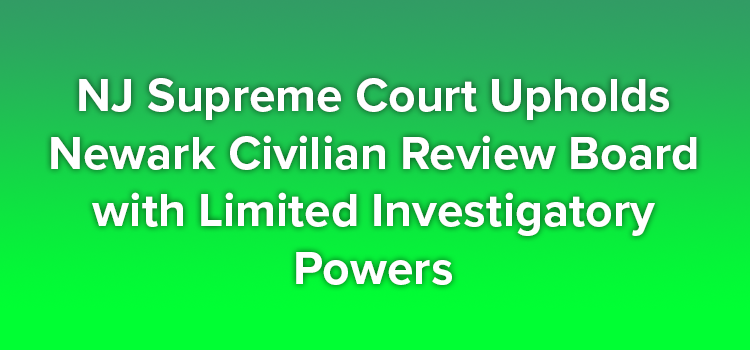
Facts of Fraternal Order of Police, Newark Lodge No. 12 v. City of Newark
Municipal Ordinance 6PSF-B (Ordinance) establishes the Civilian Complaint Review Board (CCRB or the Board), within the Office of the Mayor, to address complaints filed by citizens against the Newark Police Department and its members. The Ordinance authorizes the Board to recommend to the Public Safety Director the discipline to be imposed on individual officers. The Board’s powers and responsibilities can be divided into two categories: investigative powers and policy responsibilities.
With respect to its investigative powers, the Ordinance endows the Board with subpoena power and concurrent jurisdiction with the Newark Police Department to receive and investigate complaints against the Department’s members. The Board’s findings of fact in its investigations are, “absent clear error,” made binding on Newark’s Public Safety Director, who retains final authority over discipline of the police force. The Board is also allowed to recommend the discipline to be imposed. The Ordinance confers on the Board the added power — at the conclusion of the Newark Police Department’s own investigation into an officer’s behavior — to review the findings, conclusions, and recommendations that ensue from that internal investigation.
In its policymaking capacity, the Board can recommend to city officials procedures for investigating police conduct. The Board is also tasked with a consultative role in the development of a discipline matrix by the Public Safety Director and the affected bargaining units. Further, the Ordinance directs that Newark’s Division of Police and Department of Public Safety cooperate with the CCRB. Finally, the Ordinance establishes rules and procedures for the CCRB, one of which provides for the confidentiality of complainant identities. However, “[i]f the complaint is substantiated and is referred to a CCRB hearing, the complainant’s identity may be released in the course of any public hearing about the alleged misconduct.”
The Fraternal Order of Police, Newark Lodge No. 12 (FOP) filed a complaint claiming that the Ordinance was unlawful. The trial court invalidated the Ordinance with two exceptions: (1) the CCRB could perform an oversight function, and (2) the CCRB could consult with the Public Safety Director and NPD in the creation of the discipline matrix. On appeal, the Appellate Division held that the Ordinance is valid on its face with two exceptions. First, it found that the Ordinance infringes upon the Chief’s statutory rights by making the CCRB’s findings of fact binding, absent clear error. Second, it found that the Ordinance improperly permits disclosure of complainant and police officer identities. “Otherwise, we conclude that the CCRB can function as intended under the Ordinance, including providing an oversight role by investigating alleged police misconduct, conducting hearings, participating in the development of a disciplinary matrix, making recommendations, and issuing subpoenas,” the court wrote.
NJ Supreme Court’s Decision in Fraternal Order of Police, Newark Lodge No. 12 v. City of Newark
The New Jersey Supreme Court sustained the Ordinance, albeit with modifications. “We conclude that state law permits the creation by ordinance of this civilian board with its overall beneficial oversight purpose. Such boards must operate consistently with current statutes, however,” Justice Jaynee LaVecchia wrote. “To the extent some investigatory powers that the City wishes to confer on its oversight board conflict with existing state law, we are compelled to modify the Appellate Division’s judgment. We also invalidate the conferral of subpoena power on this review board.”
The court first addressed whether Newark has the power to legislate, by ordinance, the creation of a citizen oversight board to have a role in the review of the handling of citizens’ police misconduct complaints. After applying the three-part test set forth in Dome Realty, Inc. v. City of Paterson, 83 N.J. 212, 225-26 (1980), it concluded that the choice to establish a civilian oversight board via municipal ordinance was not preempted New Jersey law, namely the police powers statute, N.J.S.A. 40:48-2, and N.J.S.A. 40A:14-181, which directs locally created law enforcement agencies to adopt procedures for the investigation of complaints of police misconduct consistent with guidelines issued by the State’s chief law enforcement officer.
The New Jersey Supreme Court then turned to the power granted to the CCRB. It held that the CCRB can investigate citizen complaints alleging police misconduct, and those investigations may result in recommendations to the Public Safety Director for the pursuit of discipline against a police officer. However, it further held that the Board can’t exercise its investigatory powers when a concurrent investigation is conducted by the Newark Police Department’s Internal Affairs (IA) unit. As Justice LaVecchia explained. “An investigation by the IA unit is a function carefully regulated by law, and such an investigation must operate under the statutory supervision of the police chief and comply with procedures established by Newark’s Public Safety Director and the mandatory guidelines established by the Attorney General.” She added that “concurrent investigations would interfere with the police chief’s statutory responsibility over the IA function and that the review board’s separate investigatory proceedings would be in conflict with specific requirements imposed on IA investigations and their results.” The court further held that where there is no existing IA investigation, the CCRB is authorized to conduct its own investigations.
With regard to the CCRB’s oversight function, the New Jersey Supreme Court agreed with the Appellate Division, which upheld the Board’s roles in creating a disciplinary matrix to be used by the Public Safety Director and conducting oversight reviews and reporting periodically to the Public Safety Director and to the Council. “[T]he Board may conduct its oversight function by reviewing the overall operation of the police force, including the performance of its IA function in its totality or its pattern of conduct, and provide the called-for periodic reports to the officials and entities as prescribed by municipal ordinance,” Justice LaVecchia wrote.
Finally, the court addressed the Ordinance’s delegation of subpoena power to its CCRB, concluding that it “cannot be squared with existing statutes.” As Justice LaVecchia explained, “We appreciate that Newark values having a civilian body participating in the oversight of the police function. But the Legislature would have to act in order for the City to have the ability to confer subpoena power on its CCRB.”
In State v. Robert Andrews, (A-72-18/082209) (Decided August 10, 2020), the New Jersey Supreme Court held that a defendant can be compelled to disclose a cellphone password. According to the four-member majority, requiring defendants to unlock their phones does not violate the Self- Incrimination Clause of the Fifth Amendment to the United States Constitution or New Jersey’s common law or statutory protections against self-incrimination.
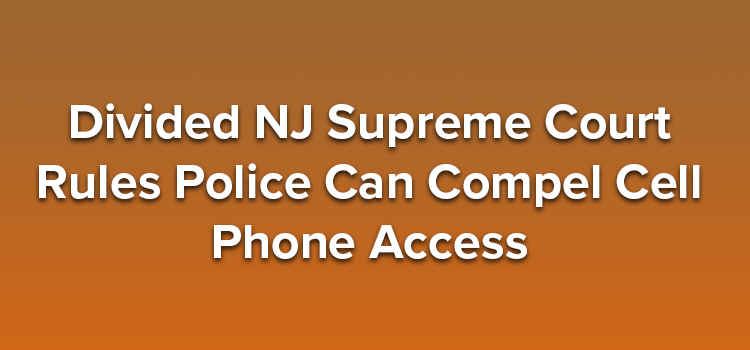
Facts of State v. Andrews
Defendant Robert Andrews, who worked as an Essex County sheriff’s officer, was identified by a suspected drug trafficker as having helped him conceal his drug-trafficking activities. A trial court judge ordered Andrews to provide the PIN and passwords for his lawfully seized iPhones that he allegedly used to aid the drug-trafficker.
Andrews argued that the compelled disclosure of this information violates his right against self-incrimination under the Fifth Amendment to the U.S. Constitution, and the protections against self-incrimination afforded under New Jersey law. However, the Appellate Division sided with the government. It held that the trial court correctly found that compelled disclosure of the defendant’s passcodes does not violate the defendant’s Fifth Amendment privilege against self-incrimination. “Applying the privilege against self-incrimination to cell phone passcodes would essentially preclude the State from obtaining the contents of any passcode-restricted device as part of a criminal investigation,” Judge Joseph L. Yannotti wrote.
NJ Supreme Court’s Decision in State v. Andrews
By a vote of 4-3, the Supreme Court of New Jersey held that a court order requiring a criminal defendant to disclose the passcodes to his passcode-protected cellphones does not violate the Fifth Amendment’s Self-Incrimination Clause or New Jersey’s common law or statutory protections against self-incrimination.
The court first addressed the Fourth Amendment, noting that Andrews didn’t challenge the search warrants issued for his cellphones. “Thus, the State is permitted to access the phones’ contents, as limited by the trial court’s order, in the same way that the State may survey a home, vehicle, or other place that is the subject of a search warrant,” Justice Solomon said.
The New Jersey Supreme Court next turned to the Fifth Amendment right against self-incrimination, emphasizing that it applies only when the accused is compelled to make a testimonial communication that is incriminating. “The Fifth Amendment right against self-incrimination applies only when the accused is compelled to make a testimonial communication that is incriminating,” Justice Solomon wrote. “Actions that do not require an individual to disclose any knowledge he might have or to speak his guilt are nontestimonial and therefore not protected.” Solomon added that in contrast to physical communications, if an individual is compelled “to disclose the contents of his own mind,” such disclosure implicates the Fifth Amendment privilege against self-incrimination.”
Applying these principles, the court concluded that communicating or entering a passcode requires facts contained within the holder’s mind and, thus, is a testimonial act of production. However, the inquiry did not end there. The court further held that compelled production of the passcodes falls within the foregone conclusion exception. Under the Fifth Amendment exception, production that is of a testimonial nature can be compelled if the Government can demonstrate it already knows the information that act will reveal — if, in other words, the existence of the requested documents, their authenticity, and the defendant’s possession of and control over them — are a foregone conclusion.
“Based on the record before us, we have little difficulty concluding that compelled production of the passcodes falls within the foregone conclusion exception,” Justice Solomon wrote. “The State’s demonstration of the passcodes’ existence, Andrews’s previous possession and operation of the cellphones, and the passcodes’ self- authenticating nature render the issue here one of surrender, not testimony, and the foregone conclusion exception to the Fifth Amendment privilege against self-incrimination thus applies.”
Dissent in State v. Andrews Justice Jaynee LaVecchia authored a dissent, in which Justices Barry Albin and Walter Timpone joined. “In my view, … the Court’s outcome deviates from steadfast past principles protective of a defendant’s personal autonomy in the face of governmental compulsion in a criminal matter,” LaVecchia argued.
In Sun Chemical Corporation v. Fike Corporation, (A-89-18/082815) (July 29, 2020),the New Jersey Supreme Court held that a Consumer Fraud Act (CFA) claim can be filed concurrently with a Product Liability Act (PLA) claim in the same complaint. “PLA and CFA claims may proceed in separate counts of the same suit, alleging different theories of liability and seeking dissimilar damages,” Justice Lee Solomon wrote.
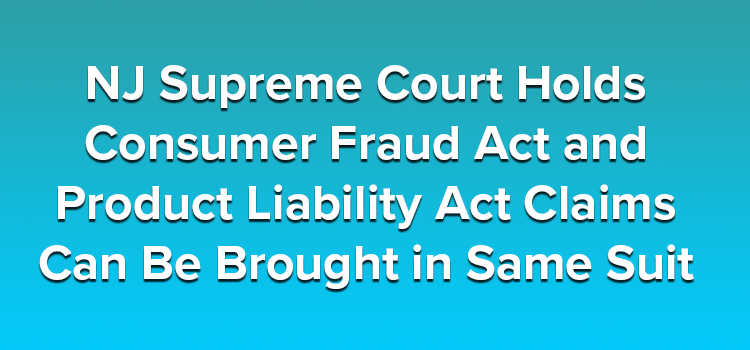
Facts of Sun Chemical Corporation v. Fike Corporation
The New Jersey Supreme Court considered, in response to a question of law certified to the Court by the United States Court of Appeals for the Third Circuit pursuant to Rule 2:12A-3, whether a Consumer Fraud Act (CFA) claim can be based, in part or exclusively, on a claim that also might be actionable under the Products Liability Act (PLA).
Sun Chemical Corporation (Sun) purchased an explosion isolation and suppression system (Suppression System) from Fike Corporation and Suppression Systems Incorporated (collectively, Fike) to prevent and contain potential explosions in its new dust collection system. On the first day that the Suppression System was operational, a fire occurred, and an alarm on the Suppression System’s control panel activated but was not audible. An explosion sent a fireball through the ducts of the dust collection system, injuring seven Sun employees and damaging Sun’s facility.
Sun brought a single-count complaint under the CFA in federal court alleging that Fike made oral and written misrepresentations about four aspects of the Suppression System: (1) the Suppression System would prevent explosions; (2) the Suppression System would have an audible alarm; (3) the Suppression System complied with industry standards; and (4) the system had never failed. The District Court granted Fike’s summary judgment motion, finding that Sun’s claims would be governed by the PLA and that it could not avoid the requirements of the PLA by crafting its claims under the CFA. Sun appealed, and after determining that extant New Jersey case law was not sufficiently on point to guide its determination of which of the two statutes to apply, the Third Circuit certified its questions to the Court, which the Court reformulated and accepted.
NJ Supreme Court’s Decision in Sun Chemical Corporation v. Fike Corporation
The New Jersey Supreme Court answered in the affirmative, concluding that PLA and CFA claims may proceed in separate counts of the same suit, alleging different theories of liability and seeking dissimilar damages.
“We conclude that, irrespective of the nature of the damages, a CFA claim alleging express misrepresentations — deceptive, fraudulent, misleading, and other unconscionable commercial practices — may be brought in the same action as a PLA claim premised upon product manufacturing, warning, or design defects. It is the nature of the claims brought, and not the nature of the damages sought, that is dispositive of whether the PLA precludes the separate causes of action,” Justice Solomon wrote. “In other words, the PLA will not bar a CFA claim alleging express or affirmative misrepresentations.”
In reaching its conclusion, the court acknowledged that there is no authority directly addressing the interplay between the CFA and PLA in the context of the case. “Nevertheless, their statutory language, legislative history, and this Court’s relevant jurisprudence regarding both statutes inform our answer to the question before us,” Justice Solomon wrote.
The New Jersey Supreme Court went on to explain that the CFA prohibits deceptive, fraudulent, misleading, and other unconscionable commercial practices in connection with the sale of any merchandise or real estate. In addition, the language of the CFA evinces a clear legislative intent that its provisions be applied broadly. Meanwhile, the PLA imposes liability upon the manufacturer or seller for a product’s manufacturing, warning, and design defects. Under the PLA, a claimant can recover damages against the manufacturer or seller of a product upon proof that the product causing the harm was not reasonably fit, suitable or safe for its intended purpose.
“The CFA and PLA are intended to govern different conduct and to provide different remedies for such conduct. There is thus no direct and unavoidable conflict between the CFA and PLA,” Justice Solomon wrote.
“The PLA governs the legal universe of products liability actions as defined in that Act, and the CFA applies to fraud and misrepresentation and provides unique remedies intended to root out such conduct,” Solomon further explained. “The failure to warn of a product defect is cognizable under the PLA, while an affirmative misrepresentation that a specific flaw did not exist, or a product had never failed may be brought under the CFA.”
According to the New Jersey Supreme Court, PLA and CFA claims may proceed in separate counts of the same suit, alleging different theories of liability and seeking dissimilar damages. Justice Solomon explained:
If a claim is premised upon a product’s manufacturing, warning, or design defect, that claim must be brought under the PLA with damages limited to those available under that statute; CFA claims for the same conduct are precluded. But nothing about the PLA prohibits a claimant from seeking relief under the CFA for deceptive, fraudulent, misleading, and other unconscionable commercial practices in the sale of the product. Indeed, the CFA is expressly “in addition to and cumulative of any other right, remedy or prohibition accorded by the common law or statutes of this State.” N.J.S.A. 56:8-2.13. Said differently, if a claim is based on deceptive, fraudulent, misleading, and other unconscionable commercial practices, it is not covered by the PLA and may be brought as a separate CFA claim.
The court went on to find that the nature of the action giving rise to a claim determines how a claim is characterized. Accordingly, it found that Sun “is mistaken in its heavy reliance on the nature of the damages it seeks, claiming they are economic losses rather than damages for injury to persons or property. As Justice Solomon explained: “The nature of the plaintiff’s damages does not determine whether the cause of action falls under the CFA or PLA; rather, it is the theory of liability underlying the claim that determines the recoverable damages.”
In Arafa v. Health Express Corp., (A-6-19-/083174) (July 14, 2020),the Supreme Court of New Jersey held that that arbitration agreements can be enforceable under the New Jersey Arbitration Act (NJAA), even if those agreements would be otherwise exempt from arbitration under Section 1 of the Federal Arbitration Act (FAA). In so ruling, the court clarified that transportation workers can be compelled to arbitrate under the NJAA even though they may be exempt from the FAA.
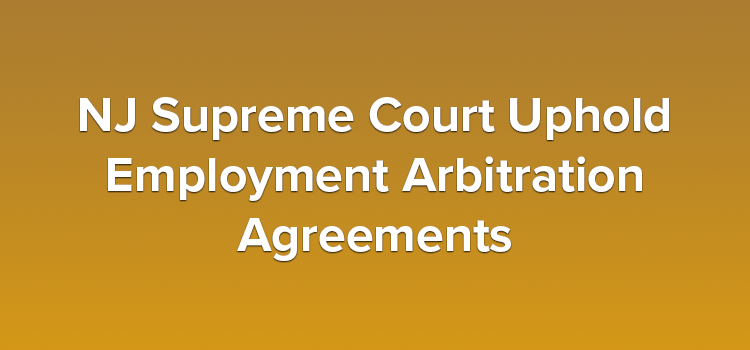
Facts of Arafa v. Health Express Corp
The New Jersey Supreme Court’s decision resolves two related cases, both of which involved arbitration agreements in contracts for employment that arguably fall within the Section 1 of the FAA. The so-called “exemption clause” provides the FAA shall not “apply to contracts of employment of seamen, railroad employees, or any other class of workers engaged in foreign or interstate commerce.”
In Gloria Colon v. Strategic Delivery Solutions, LLC, defendant Strategic Delivery Systems, LLC (SDS) is a licensed freight forwarder and broker. Each plaintiff entered into an identical employment agreement with SDS. Directly at issue are Paragraphs 19 (providing that the laws of the Vendor’s state of residence govern the agreement), 20 (an “Agreement to Arbitrate,” including an agreement to be bound by the FAA, as well as a “Voluntary Waiver to Join a Class”), and 24 (severance clause) of the employment agreements. Plaintiffs filed a class action complaint against SDS, alleging that SDS violated New Jersey laws by failing to pay overtime wages and illegally withholding monies.
The trial court granted SDS’s motion to dismiss and compel arbitration. The Appellate Division substantially agreed with the trial court, holding that plaintiffs waived their right to a jury trial. The appellate court remanded, however, for a determination of whether plaintiffs were engaged in interstate transportation because, “if plaintiffs are not engaged in interstate commerce, then the FAA’s section one exemption would not apply (assuming they are providing transportation services), and plaintiffs would be required to arbitrate their claims under the FAA.” If on the other hand plaintiffs “are engaged in interstate commerce and exempt under the FAA,” then the court “will enforce the arbitration provision under the NJAA.” The Colon court likewise found that plaintiffs had clearly and unambiguously waived their ability to proceed as a class on their statutory claims, distinguishing this case from Muhammad v. County Bank of Rehoboth Beach, DE, 189 N.J. 1, 15-16 (2006), in which the Court found unconscionable a class-arbitration waiver embedded in a consumer contract of adhesion, because Colon “does not involve a class- arbitration waiver and it was not a consumer contract.”
In Essam Arafa v. Health Express Corporation, plaintiff Essam Arafa began working for defendant Health Express Corporation (Health Express) in April 2016. He was hired to deliver medicines and pharmaceutical products from pharmacies and medical offices in New Jersey to customers throughout the state and in surrounding areas. Plaintiff signed an employment agreement and an arbitration agreement with Health Express. The arbitration agreement indicated that it “is governed by the [FAA].” It contained both a “Class Action Waiver” and an “Enforcement Clause” providing that “in the event any portion of this Agreement is deemed unenforceable, the remainder of it will be enforceable.” Plaintiff filed a class action complaint against Health Express, alleging violations of New Jersey’s Wage and Hour and Wage Payment Laws, among other claims.
The trial court granted Health Express’s motion to dismiss and compel arbitration and ordered the class to pursue all claims in arbitration on an individual basis. The Appellate Division reversed, holding that plaintiff was exempt from the FAA and its requirements concerning arbitration under section 1 and that the inapplicability of the FAA undermined the entire premise of the parties’ contract.
NJ Supreme Court Decision in Arafa v. Health Express Corp
The New Jersey Supreme Court sided with the defendants in both cases, holding the arbitration agreements are enforceable. “We now hold that the NJAA applies in the absence of the FAA and that the arbitration agreements at issue are enforceable under the NJAA if the FAA does not apply,” Justice Faustino Fernandez-Vina wrote. “We therefore agree with the Appellate Division’s decision in Colon and reverse the judgment of the Appellate Division in Arafa.”
In reaching its decision, the court rejected arguments that the NJAA was not applicable unless it was expressly invoked in the agreement. “In short, for arbitration agreements forged since 2003, there has been no need to express an intent that the NJAA would apply because its application has been automatic, absent preemption. In these appeals, we are well beyond the date upon which application of the NJAA became mandatory for all non-exempt arbitration agreements, whenever made, that are governed by the laws of New Jersey,” Justice Fernandez-Vina explained. “We therefore reject any argument that the absence of an express invocation of the NJAA means that it cannot apply. Rather, the NJAA applies to the agreements unless preempted by the FAA.”
With regard to preemption, the New Jersey Supreme Court went on to hold that the “application of the NJAA” would not “frustrate the principal purpose of the FAA by discriminating against arbitration agreements.” It further rejected the argument that finding the arbitration agreement enforceable under the NJAA would conflict with Congress’s intent to exclude certain kinds of contracts for work from arbitration. “Congress’s motive behind the exemption was to provide more specific legislation for workers engaged in transportation services,” Justice Fernandez-Vina wrote. “Congress did not intend to exclude transportation workers from arbitration altogether, but rather to subject their agreements to other statutes that may or may not require arbitration.”
Based on the foregoing, the New Jersey Supreme Court concluded that the NJAA will apply to the agreement in Arafa and may apply to the agreement in Colon if it is determined upon remand that section 1 applies.
